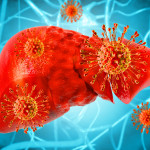People coinfected with HIV and hepatitis C virus (HCV) have a much lower risk of death after ridding themselves of HCV. Researchers followed 3,500 coinfected Europeans treated for hep C and compared death rates between the 29 percent who were cured (“responders”) and the 45 percent who were not (“non-responders”). (Another 26 percent had an unknown response.)
During the median 3.8 years that the participants were followed in the study, 213 of them (6.1 percent) died.A respective 0.68 percent and 1.23 percent of the responders and non-responders died each year from any cause. After adjusting for various factors, the researchers found that the non-responders had a significantly higher overall risk of death.
Non-responders were 5.3 times more likely to die of liver-related causes than responders. Among responders, 10.8 percent of all deaths were liver-related, compared with 35.4 percent of the deaths among non-responders. After adjusting for various factors, the researchers found that non-responders still had a 4.5-fold higher risk of liver-related death.
“Liver cancer can develop several years after hepatitis C has been cured in people with severe liver damage at the time of hepatitis C treatment,” notes Lars Peters, MD, a senior researcher at the University of Copenhagen’s Rigshospitalet and the study’s lead author. “We didn’t find any cases of liver cancer in our group of [cured] patients, but it would be relevant to follow our patients longer to see if the risk of liver cancer and other liver-related clinical events continue to remain low.”






Comments
Comments